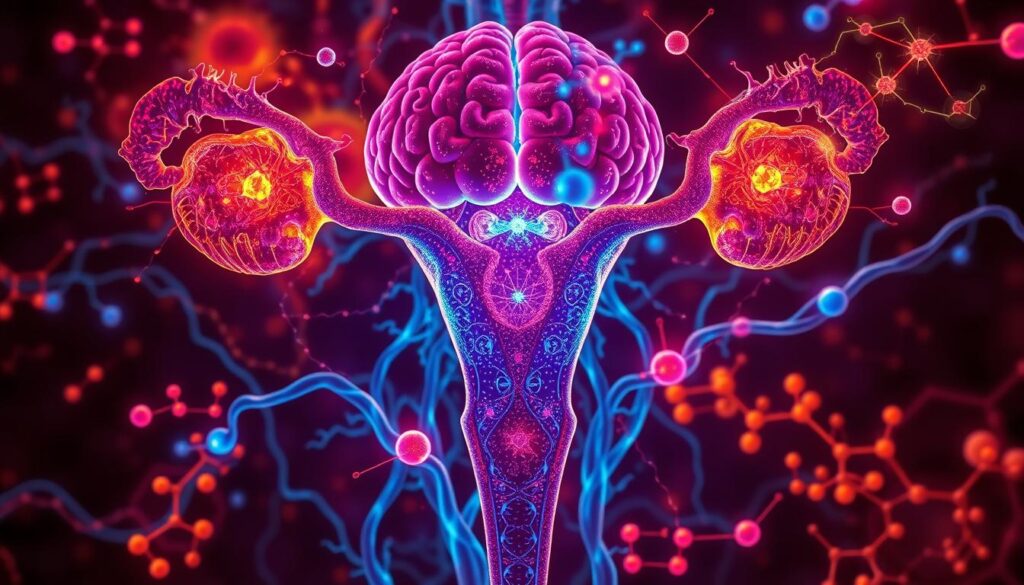Looking into why Female Libido Higher Than Male is fascinating. It’s shaped by biology, psychology, and culture. By studying these differences, we learn more about human sexuality. This article will explore these factors in detail, making it easy to understand.
Understanding Libido: The Basics
Libido is about how much someone wants to be intimate. It’s shaped by many things that make people different. Knowing about libido helps us see how men and women are different in their desires.
Definition of Libido
Libido is the want for sex, which changes for many reasons. It’s about both feeling and physical attraction. It’s different for everyone, because of many things like biology and mind.
Key Factors Influencing Libido
Many things mix together to affect our desire for sex. These include:
- Hormonal levels: Changes in hormones like estrogen and testosterone are key.
- Psychological state: Mental health or stress can change our desire.
- Relationship quality: Being close to someone can boost our libido.
- Cultural background: Our upbringing and society’s views shape our views on sex.
- Physical health: Being healthy and fit affects our sexual drive.
- Environmental stressors: Life’s challenges and stress can impact our libido.
Learning about libido and what affects it helps us understand women’s sexual drive better.

The Biological Perspective of Female Libido
The biological perspective gives us a deep look into female libido. It shows how hormones play a big role in sexual desire. Studies show how these hormones change over time, affecting women’s sexual experiences.
The mix of estrogen and testosterone is key. It shows how biology drives women’s sexual interest.
Hormonal Influences on Female Sexual Desire
Hormones change a lot in women, affecting their sexual desire. Estrogen and testosterone are the main players. Estrogen levels go up during ovulation, making women more interested in sex.
This shows how biology controls women’s libido. Research says that women’s sexual desire changes over time because of hormones. A study found that we need to rethink how we see women’s sexual variability based on long-term data.
The Role of Estrogen and Testosterone
Estrogen boosts women’s sexual response and desire when they’re most fertile. Testosterone also plays a part, though in smaller amounts than in men. Even a little testosterone can increase sexual desire.
This shows how complex female hormones are. The mix of estrogen and testosterone is what drives women’s sexual interest. This supports the biological view of female libido.

Cultural Influences on Female Sexuality
Culture shapes how women see their sexuality and the views around it. In many places, society has made female desire taboo, making women feel ashamed. This has made it hard for them to show their true feelings.
But, as cultures change, media and books are showing women in a new light. They are now seen as strong and proud of their desires.
Societal Attitudes Towards Female Desire
How society views female desire affects women’s lives. Often, it’s seen as something to be ashamed of, not as important as men’s. But, by changing these views, we can help women feel more confident about their desires.
Creating a space where women can talk about their needs is key. This way, they can explore their sexuality without fear of being judged.
Impact of Media and Literature on Female Libido
The way media shows female sexuality has changed a lot. Books, movies, and TV shows now feature women who are proud of their desires. These stories challenge old beliefs and help women see their desires in a positive light.
Media’s role in showing female libido is huge. It’s helping to change how society views female sexuality. This shift is all about accepting and celebrating women’s sexual expression.

Psychological Factors Affecting Libido
Understanding the link between psychological factors and libido shows how mental health affects sexual desire. Many women see their sexual motivation change due to emotional wellness. Working on mental health can improve sexual experiences.
The Role of Mental Health in Sexual Desire
Mental health is key in sexual desire. Anxiety and depression can lower libido, making sex hard for some women. On the other hand, good mental health boosts sexual motivation and enjoyment.
Women who take care of their mental health often have better sex lives.
Self-Image and Its Influence on Libido
How women see their sexual attractiveness affects libido. A positive self-image boosts confidence, leading to more libido. Women who feel good about their bodies are more open to exploring their sexuality.
Confidence is crucial for a fulfilling sexual life. It’s important to have a healthy self-image for better sex.
Exploring Why Female Libido Higher Than Male
When we talk about exploring female libido, many factors come into play. Hormonal changes throughout a woman’s life can greatly affect her desire. The levels of estrogen and testosterone can make her feel more sensual and interested in sex.
Cultural changes have also played a big role. Women’s empowerment movements have made it easier for women to talk about their desires. This openness helps women understand and express their needs better.
Psychological openness is also key. When women feel emotionally close to their partners, their desire for sex can grow. This emotional connection is crucial and can change how men and women experience sex together.
Looking into these areas helps us understand why female libido might be higher. For more on the similarities and differences in male and female sexuality, check out this article on men, women, and sexuality.
The Cycle of Female Sexual Desire
Female sexual desire is shaped by many factors, including the menstrual cycle. This natural cycle can change a woman’s sexual interest throughout the month. Knowing these changes helps us understand how our bodies and life experiences affect our libido.
Menstrual Cycle and Libido Variation
Many women feel more sexually interested during ovulation, when they are most fertile. This might be because of hormonal changes, like higher estrogen levels, which boost libido. This shows a strong link between our biology and sexual desire.
Life Stages and Their Impact on Female Desire
As we go through life, our sexual desire can change. Pregnancy and postpartum can make libido go up and down because of hormones and emotions. Menopause also changes how women feel about intimacy. Knowing this helps us meet women’s sexual needs better.
Big life changes can impact our mental and physical health, affecting our sex life. Understanding this connection is key to a holistic view of sexual health. It helps both women and their partners deal with the ups and downs of desire over time.
Getting to know the complex world of libido leads to better talks about sex and happier relationships. As we move through life, it’s crucial to see the special of female sexuality. This is vital for building strong, healthy sexual connections.
Comparative Studies: Female vs. Male Libido
Many studies look into the interesting differences in libido between men and women. They help us understand how sexual desire varies between genders. These studies give us valuable insights into libido and its complexities.
Research Findings on Sexual Desire Differences
Recent studies show that women often have more varied sexual desires than men. Factors like emotional connection and hormonal changes affect women’s sexual desire. Men, on the other hand, tend to have more stable libido.
Key Comparisons in Libido Metrics
Studies measure libido in different ways. They look at how often people think about sex, how much they desire it, and their physical responses during arousal. Women’s sexual desire is often more emotionally complex, while men’s is more straightforward.
Impact of Relationships on Female Libido
Relationships can greatly affect a woman’s sexual desire. A strong emotional bond can boost libido, making intimacy safer. Feeling secure and loved can increase sexual interest.
How Emotional Connection Influences Desire
Being emotionally connected to a partner is key to sexual desire. Studies show that women’s libido increases with deep emotional ties. This connection builds trust and vulnerability, crucial for attraction.
The Role of Communication in Sexual Satisfaction
Good communication is vital for a satisfying sex life. Talking openly about desires and boundaries helps couples understand each other. This openness can improve intimacy and boost libido.
The Influence of Fertility on Libido
Fertility greatly affects female libido, especially during ovulation. This connection shows how our bodies can boost sexual desire during the fertile window.
Understanding Libido During Ovulation
When ovulation happens, hormones change, making women more fertile and interested in sex. These changes can make testosterone levels go up, even in women. This increase makes them more interested in sex.
Studies show women become more aware of potential partners and flirt more during ovulation. This natural behavior is linked to wanting to have children, showing the strong connection between fertility and libido.
Signs of Increased Sexual Desire in Fertile Women
Women may show certain signs of increased sexual desire during their fertile window. Some key indicators include:
- Heightened sensitivity: Many women notice increased sensitivity in erogenous zones.
- Physical changes: Some experience changes in cervical mucus, which can indicate fertility.
- Increased libido: A surge in sexual desire often parallels the ovulation cycle.
- Enhanced attraction: Women may feel more attractive and desirable, both internally and externally.
Health and Wellbeing Impact on Libido
Good health is key to sexual desire. Many factors, like physical conditions and hormonal changes, affect libido. Knowing how health impacts libido helps us understand sexual satisfaction better.
Physical Health and Sexual Desire
Physical health is closely tied to sexual desire. Being healthy can make sex more enjoyable. But, health problems can lower libido.
Diabetes, obesity, and heart issues can reduce sexual desire. They affect hormone levels and body function. Regular exercise, a healthy diet, and good healthcare can boost libido and sexual health.
Stress and Its Effects on Sexual Health
Stress hurts sexual health and well-being. High stress can cause anxiety, lowering sexual desire and enjoyment. Stress and libido are linked, so managing stress is crucial.
Mindfulness, meditation, and enough sleep can reduce stress. This helps improve libido and overall sexual health.
Gender Norms and Sexual Expression
Gender norms in sexuality deeply affect how we see and share our desires. For a long time, society has pushed women’s desires to the side. This has led to stereotypes that make women’s sexual needs seem wrong or shameful.
But, as society changes, these old beliefs are being questioned. This shows a big shift in how women view their sexuality.
Breaking Stereotypes Related to Female Desire
Challenging stereotypes about female desire is a big step. Movements for sexual freedom are growing. They push for open talks about what women want sexually.
This change lets women say they have the right to feel and share their sexuality freely. Awareness efforts and learning programs help break down old views. They help start a wider conversation about sex.
The Evolution of Female Sexual Freedom
In the last few decades, women’s sexual freedom has grown a lot. Cultural shifts and feminist movements have helped change how we see women’s sexuality. Women are now talking more about their sexual identities and what they want.
This shift is challenging old gender norms in sexuality. It’s leading to more acceptance and understanding of women’s sexual needs.
Enhancing Female Libido: Tips and Strategies
Boosting female libido needs a mix of strategies. Women looking to increase their sexual desire can try practical lifestyle changes. Here are some tips that can help.
Your Guide to Boosting Sexual Desire
- Maintain a balanced diet: Eating foods rich in nutrients can boost energy and health. This might also increase libido.
- Engage in regular exercise: Exercise improves body image and mood. It releases endorphins, which can boost sexual desire.
- Manage stress: Stress can lower libido. Using mindfulness or yoga can help manage stress and boost libido.
- Communicate with your partner: Talking openly about desires can strengthen emotional connection. This can lead to higher libido.
Healthy Practices for Better Libido
- Consider herbal supplements: Herbs like maca root or ginseng may support sexual health and libido.
- Prioritize sleep: Getting enough rest is key for hormonal balance and wellbeing. It positively affects sexual desire.
- Explore new experiences: Trying new things with your partner can spark passion and curiosity. This can boost sexual desire.
The Importance of Sexual Education
Sexual education is key to understanding female sexuality. It helps people feel confident about their sexual health. It also fights harmful stereotypes and myths, especially about female libido.
Educating on Female Sexuality
Knowing about female sexuality is crucial for healthy relationships and self-acceptance. Good sexual education covers the biological, emotional, and psychological sides of female desire. It makes space for open talks about sexual health, letting women discover their desires and needs.
Addressing Myths Surrounding Female Libido
Many myths about libido still exist, causing confusion and stigma. Sexual education helps clear these myths. It shows that female libido is complex and influenced by many things. Education helps women understand and accept their sexual identities.
The Future of Female Libido Research
The field of female libido research is set to grow and explore new areas. Changing societal views are opening doors for deeper studies on female sexual desire. Researchers will dive into the complexities of female libido, a key part of human sexuality.
Future studies will look at many angles, like cultural, technological, and psychological impacts. For example, how dating apps and social media change women’s views on libido is still a mystery. By studying both biological and social factors, researchers aim to give a full picture of women’s sexual experiences.
This growing interest in female libido shows the need for more detailed research. As women speak up for their sexual health, science must keep up. This research promises to help both academics and the public understand female sexual empowerment better.






